If you're a woman, you may be wondering if you need to worry about protein intake. The answer is yes – women do have different protein needs than men, especially during pregnancy and the postpartum period. But don't worry, it's not as complicated as you might think. In this post, we'll explore the basics of female protein needs and give you some tips for meeting them.
Let's talk women and protein!
First, what is protein?
Proteins are made up of different combinations of amino acids. They are not all created equal, and play many critical roles in the body. There are 20 different amino acids, 11 which are non-essential, meaning our body can produce them, and 9 that are essential, meaning we have to get them from our diet. So, when a protein is considered a “whole protein,” that means it contains all 9 of the essential amino acids that we need from food.
There are several different types of proteins in the human body.
-
Proteins in the immune system
-
Antibodies that help fight infection
-
Complement system that is activated during infections
-
-
Proteins in the muscles
-
Actin and Myosin – interact for muscle movement
-
Myoglobin – releases oxygen to the muscles
-
Ferritin – stores and releases oxygen
-
-
Signaling proteins
-
Cytokines – help communicate with other cells
-
-
Structural proteins
-
Cytoskeleton – maintain cell shape
-
Keratin – found in skin, nails, and hair
-
Collagen – provides strength
-
Elastin – provides flexibility
-
-
Enzymes
-
Digestive enzymes – help break down food
-
-
Cell Membrane
-
Act as enzymes
-
Act as receptors
-
Form channels for movement of substances between membranes
-
-
Proteins in the blood
-
Hemoglobin – transports oxygen
-
Albumin – maintains proper amount of liquid in blood
-
Fibrinogen – clots blood
-
Why is it important?
Protein is important for the building of muscles, bones, cartilage, and skin, and the repairing of muscle tissue. Adequate protein intake promotes a healthy metabolism by requiring more calories to digest than the other macronutrients. It also helps with satiety at meals and is vital when it comes to body composition changes – muscle gain and fat loss. Regular consumption throughout the day (around every 3-4 hours) has been shown to be ideal, versus an intake of large quantities less often. Factors that influence dietary protein metabolism include the composition of the protein, the composition of the meal (i.e. amount of each macronutrient consumed), the amount of protein ingested, and the specifics of your exercise routine.
Whey Back Vanilla Grass-Fed Whey Protein
$64.99
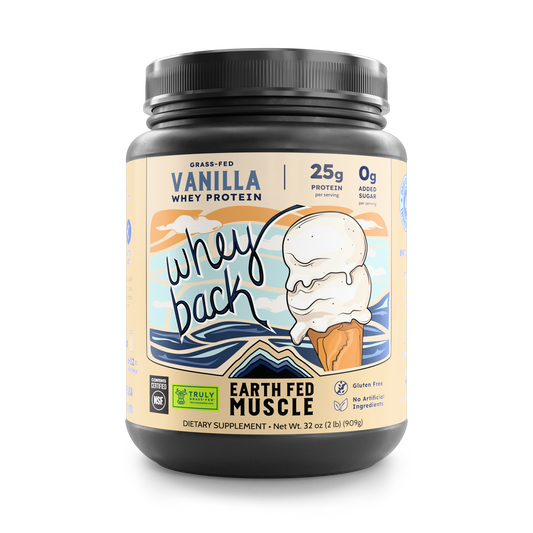
When it comes to healing an injury or preserving any muscle from wasting away during a time of inactivity (i.e. post-partum or injury), protein is extremely important and daily intake needs will be increased. Protein also plays a core role in immune health and allows the body to create antibodies that help fight infections.
What are some good sources of protein?
When it comes to finding whole protein sources, animal products such as meat, poultry, eggs, fish, and dairy are superior over plant protein. Plant protein often requires you to do a little mix and match to make sure you are getting all of the essential amino acids that you need. There are, however, some plant-based sources that are complete such as quinoa, buckwheat, hempseed, soybeans, and chia seeds.
If you are a vegan/vegetarian then you may need to combine plant-based proteins in order to meet your daily protein needs. Pairing can be legumes + grains/seeds/nuts.
For Example:
-
Beans + Rice
-
Peanut butter sandwich on whole- wheat bread
-
Whole grain pita bread + hummus
-
Tacos with beans and wheat tortilla
-
Oatmeal + peanut butter
Protein during pregnancy
During pregnancy protein is essential for providing the building blocks for your baby’s development. Always try to get your protein from whole food sources first, but if you are interested in taking protein shakes or powders check with your healthcare provider for safety. During the second and third trimester when baby is growing rapidly, and your body is experiencing substantial growth as well, it is critical to get enough protein in.
Chocolate Shakeup Chocolate Grass-Fed Whey Protein
$64.99
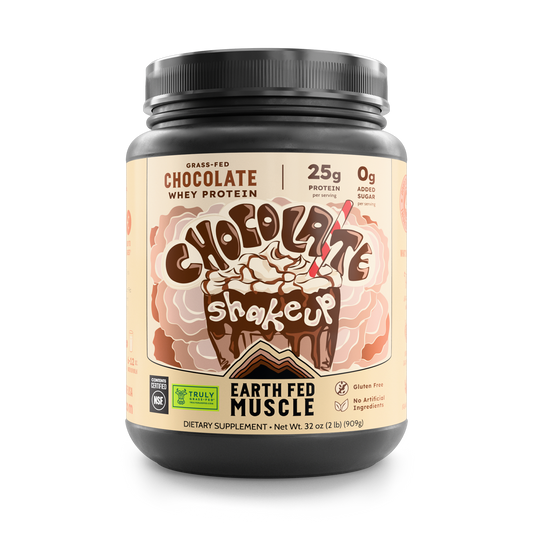
The recommended daily intake for women during pregnancy is around 60-100 g/day. This number will vary among individuals based off of weight, trimester, and activity level, but comes down to around 1.1 g of protein/kg/day compared to a non-pregnant state of .8 g of protein/kg/day. If you have not been getting enough protein in your diet during pregnancy then you may be experiencing symptoms of muscle fatigue, fluid retention, and weight loss.
Some protein-rich foods to choose during pregnancy include lean meat, poultry, fish and shellfish, eggs, dairy, tofu, and beans. When it comes to picking fish selections, make sure you are choosing low-mercury options. Fish has so many benefits for you and your baby, but some contain high amounts of mercury which can be dangerous to your baby’s development. Low-mercury fish and shellfish options include shrimp, canned LIGHT tuna, salmon, pollock, oysters and mussels, tilapia, crab, sardines, scallops, clams, and catfish.
Protein postpartum
Higher protein intake postpartum can help you recover more quickly from labor because it provides the building blocks for growth and repair. Collagen, for example, is a much-needed protein at this stage as it is responsible for skin elasticity, joint-supporting connective tissues, and supports the repair and rebuilding of damaged muscle tissues that can occur during childbirth.
Some food examples that can help deliver the nutrients to make collagen are:
-
Bone broth
-
Meat
-
Fish
-
Eggs
-
Leafy greens
-
Citrus
-
Berries
-
Chia seeds and pumpkin seeds
Prioritize protein intake for healing in those first several weeks after birth, and then once you are cleared by your doctor can you then focus on manipulating protein intakes for weight loss and body composition changes. Manipulation of protein intake postpartum and throughout motherhood is key when it comes to achieving your desired body composition. If you have a goal to add muscle and lose fat then you have to be consuming an adequate intake of protein. This amount can be based off of individual variables such as your age, training status, and amount of lean body mass. Talk with a nutrition professional if you are curious as to what your intake should be based off of your goals.
When is it OK to supplement?
First and foremost, if you are pregnant always ask your healthcare provider before consuming any protein supplements. When you have approval, and a whole food protein source is not available or convenient, then portable protein supplements that contain high quality ingredients may serve as an alternative.
Magic Beans Mocha Grass-Fed Whey Protein
$64.99
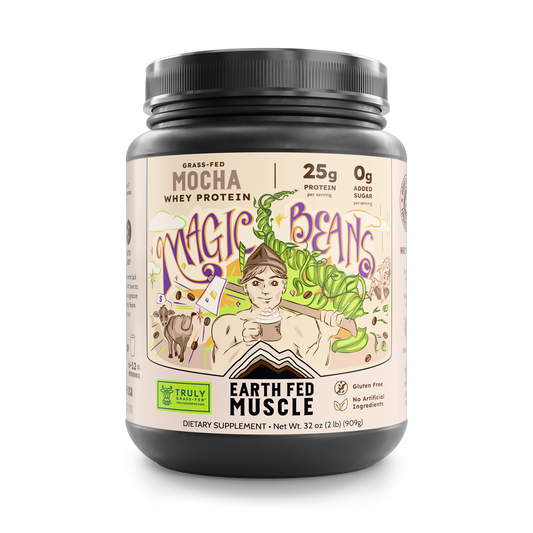
When considering protein supplementation during pregnancy it is important to know that some can have added vitamins and minerals, which you are already getting in your prenatal, so you may be getting more than you need. They may also contain very large amounts of protein, sugar, additional herbs, or even caffeine, which could cause some harm to you and your baby if consumed regularly. Protein shakes are considered a supplement and therefore are not tested for safety on pregnant women, so overall the best way to get your protein in during pregnancy is by eating a balanced diet with a variety of protein-rich foods.
Protein supplementation outside of pregnancy can be beneficial and allow for easily accessible and fast digesting protein post workout or when you are in a time crunch. Protein intake post workout is encouraged, especially after strenuous exercise, as it can effectively help increase muscle strength and favorable change in body composition. Protein ingestion post resistance training has been shown to stimulate muscle protein synthesis (MPS) – AKA muscle building. So, get your protein in as soon as you can after exercise to help with recovery and the building of new muscle tissue.
What type of protein is best for you if you have body composition goals?
Dairy proteins seem to be superior to other tested proteins due to their high leucine content and the digestion and absorption of branch chain amino acids (BCAAs) in food-based dairy products. Leucine is an amino acid that appears to be a trigger for MPS and helps promote recovery and adaptation from exercise. Dairy protein tends to have a larger amount of leucine content making is superior in regards to muscle building.
-
Whey protein – a fast-acting protein that contains all of the essential amino acids needed to build muscle. Ideal for post-workout when trying to get protein into the muscles as quickly as possible. Can be considered a muscle building protein.
-
Casein protein- a slower digesting protein that can be considered anticatabolic, or muscle-sparing, because it provides a steady release of amino acids over time that helps prevent muscle tissue break down. This would be an ideal protein to take at night to reduce that amount of muscle breakdown that occurs, and can help with satiety if you are someone that wakes up hungry.
Nocturnal Dark Chocolate Casein Protein
$49.99
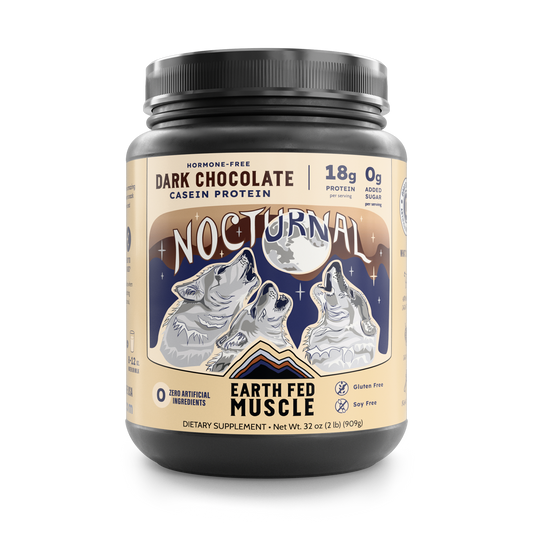
Plant protein is harder to digest than animal protein. It also has “anti-nutrient” factors such as phytic acid that limit the absorption of nutrients. Soy appears to be comparable to whey protein in terms of digestibility, but due to its anti-nutrient factors whey protein is the superior protein in regard to digestibility.
Common Ground Chocolate Plant Protein
$59.99
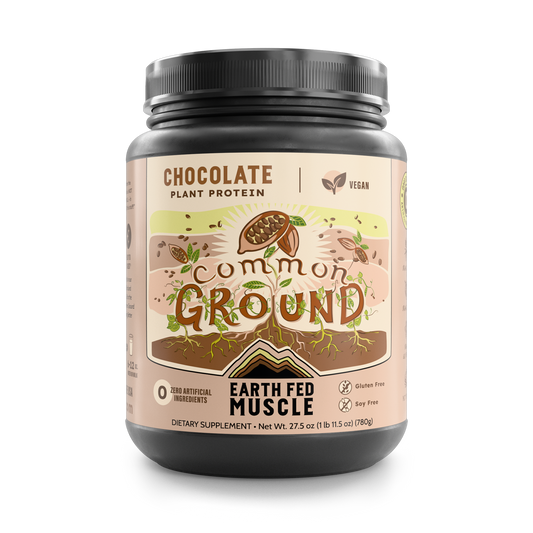
Overall take away
Protein consumption is a key component of a health balanced diet. Depending on goals, age, pregnancy/postpartum status, and activity level, intake needs will vary. Always reach out to a nutrition professional to help determine an appropriate amount for you and your goals!
By: Anna Mullane MS, CISSN, Nutritionist
